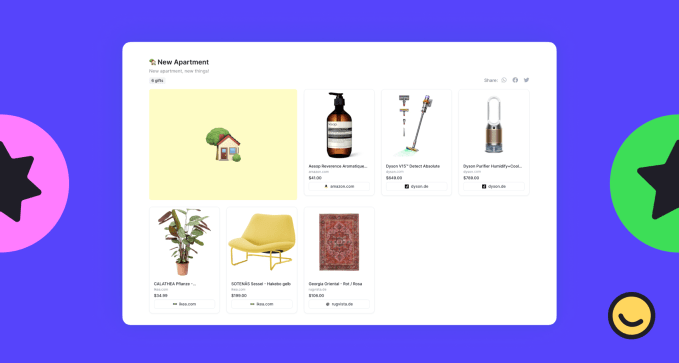Throne, which lets fans gift items to creators from their wishlist, is launching a new gifting portal for family and friends called Happy Wishlist. However, the more interesting bit of the story is that last year, the company returned the money it had raised from investors and opted for the bootstrapped route.
Starting Throne
The startup was founded by Patrice Becker and Leonhard Soenke in 2021. The duo previously started the calendar management app Meeter, which was acquired by workflow automation startup Bardeen.
In February, the company raised $830,000 in a SAFE note from investors like Ryan Hoover’s Weekend Fund, Z Fellows’ Cory Levy and Vibhu Norby (B8ta) with a valuation cap of $30 million.
A SAFE note is a way to raise money right now and define the company’s valuation at a later stage, usually during the next investment round. It’s a popular founder-friendly fundraising method for early-stage startups that want to raise some pre-seed or seed money without getting diluted right away.
Image Credits: Throne
The co-founders started exploring the idea of Throne when some of their creator friends talked about issues like creating a P.O. Box, maintaining privacy and other issues like a limited catalog and delivery issues.
“There was no solution on the market for content creators to safely receive physical gifts. The core issue is creator privacy: The address of the creator cannot be revealed to the fan and thus we act as a firewall between creators and their fans,” Becker told TechCrunch.
Throne lets creators build a wishlist through various sources around the web. Fans can gift creators items from that list. Throne ensures that no personal information like addresses or payment details are exposed to either party. The company also lets creators turn a wishlist item into a crowdfunded gift.
While Throne claims to be a secure solution, the startup’s name came up in the news due to a security bug. Last year, Zerforschung, a German collective of security researchers, found a bug in the platform that exposed creators’ private addresses. Throne didn’t disclose details but said it fixed the bug. It also claimed that an unnamed German data privacy expert “confirmed that there was no data risk.”
The startup earns money by charging a commission to partner brands whose items are gifted to creators on sales. For non-partner brands, Throne charges a service fee on top of the gift’s price to fulfill the order. The startup crossed the mark of 400,00 creators on the platform last month.

Image Credits: Throne
Twitch is the most important platform for the company. More than half of the creators signed up on Throne through Twitch login. Creators can set up stream alerts for new gifts or contributions so they can potentially give a shout-out.
Returning investor money
Throne CEO Patrice Becker added that Throne had surpassed $1 million in purchases in gifts for a month with a growth rate of 50% month-on-month in 2021 prior to raising the seed round. This led to the company raising a non-dilutive round.
Eventually, in the summer of 2023, the company realized that the market it is addressing might not lead to a venture-backed outcome. While the company was about to raise its Series A, it decided to turn toward profitability and returned the investor money by December 2023.
“We know of many companies with a limited market size but healthy revenues that could operate profitably — but they are ‘stuck’ in the VC cycle. For them, liquidation preferences and investor pressure to deploy the capital they raised (often creating a high-cost basis) put them in a position where they have no choice other than to hope for a unicorn outcome,” Becker said.
“We kept on developing our team as lean and efficiently as possible, allowing us to move very fast and with very little management overhead. We were at a rate of mid-seven figures in revenue and profitable when we decided to fully pay back our investors. We generated enough of a safety cushion for us to feel comfortable paying back the investment before doing so.”

Image Credits: Throne
The company has other products such as Throne Storefront, which is a link-in-bio product for brands like Linus Media Group. There is also Throne Exchange, which is a virtual Secret Santa system allowing users to send gifts to each other without revealing addresses. Becker said that 1,500 people across the globe participated in the Christmas gift exchange last year. Both of these verticals contribute a small amount to the company’s revenue.
Opening Happy Wishlist
After looking at fans gifting items to creators, the founders realized that there is space for wishlist-based gifting in a personal environment as well. The company’s newest service, Happy Wishlist, focuses on wishlists for friends and family. Friends can order items from a wishlist to their own address, and hand them to the receiver physically at an event or a party.

Image Credits: Throne
Because friends are ordering items to their own addresses, the startup doesn’t need to be involved in order fulfillment.
The company is looking at making money through affiliate links as well as partnerships with brands to take commissions from purchases. Becker said that the startup is aiming to make Happy Wishlist a “multi-million” revenue product within the next year with its monetization strategy. Essentially, Throne is diversifying its revenue sources already — instead of raising money, it wants to make money.




